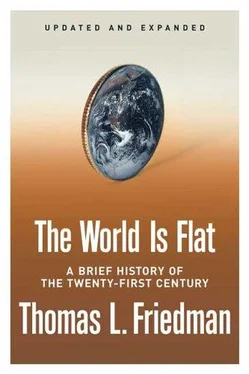All of this global sourcing is for the purpose of designing and building planes faster and cheaper, so that Boeing can use its cash to keep innovating for the next generation and survive the withering competition from Airbus. Thanks to the triple convergence, it now takes Boeing eleven days to build a 737, down from twenty-eight days just a few years ago. Boeing will build its next generation of planes in three days, because all the parts are being computer-designed for assembly, and Boeing's global supply chain will enable it to move parts from one facility to another just in time.
To make sure that it is getting the best deals on its parts and other supplies, Boeing now runs regular “reverse auctions,” in which companies bid down against each other rather than bid up against each other. They bid for contracts on everything from toilet paper for the Boeing factories to nuts and bolts-the off-the-shelf commodity parts-for Boeing's supply chain. Boeing will announce an auction for a stated time on a specially designed Internet site. It will begin the auction for each supply item at what it considers a fair price. Then it will just sit back and watch how far each supplier wants to undercut the others to win Boeing's business. Bidders are prequalified by Boeing, and everyone can see everyone else's bids as they are submitted.
“You can really see the pressures of the marketplace and how they work,” said Pickering. “It's like watching a horse race.”
The Other Triple Convergence
I once heard Bill Bradley tell a story about a high-society woman from Boston who goes to San Francisco for the first time. When she comes home and is asked by a friend how she liked it, she says, “Not very much-it's too far from the ocean.”
The perspective and predispositions that you carry around in your head are very important in shaping what you see and what you don't see. That helps to explain why a lot of people missed the triple convergence. Their heads were completely somewhere else-even though it was happening right before their eyes. Three other things-another convergence— came together to create this smoke screen.
The first was the dot-com bust, which began in March 2001. As I said earlier, many people wrongly equated the dot-com boom with globalization. So when the dot-com boom went bust, and so many dot-coms (and the firms that supported them) imploded, these same people assumed that globalization was imploding as well. The sudden flameout of dogfood.com and ten other Web sites offering to deliver ten pounds of puppy chow to your door in thirty minutes was supposed to be proof that globalization and the IT revolution were all sizzle and no beef.
This was pure foolishness. Those who thought that globalization was the same thing as the dot-com boom and that the dot-com bust marked the end of globalization could not have been more wrong. To say it again, the dot-com bust actually drove globalization into hypermode by forcing companies to outsource and offshore more and more functions in order to save on scarce capital. This was a key factor in laying the groundwork for Globalization 3.0. Between the dot-com bust and today, Google went from processing roughly 150 million searches per day to roughly one billion searches per day, with only a third coming from inside the United States. As its auction model caught on worldwide, eBay went from twelve hundred employees in early 2000 to sixty-three hundred by 2004, all in the period when globalization was supposed to be “over.” Between 2000 and 2004, total global Internet usage grew 125 percent, including 186 percent in Africa, 209 percent in Latin America, 124 percent in Europe, and 105 percent in North America, according to Nielsen/ NetRatings. Yes, globalization sure ended, all right.
It was not just the dot-com bust and all the hot air surrounding it that obscured all this from view. There were two other big clouds that moved in. The biggest, of course, was 9/11, which was a profound shock to the American body politic. Given 9/11, and the Afghanistan and Iraq invasions that followed, it's not surprising that the triple convergence was lost in the fog of war and the chatter of cable television. Finally, there was the Enron corporate governance scandal, quickly followed by blowups at Tyco and WorldCom-which all sent CEOs and the Bush administration running for cover. CEOs, with some justification, became guilty until proven innocent of boardroom shenanigans, and even the slavishly probusiness, pro-CEO Bush administration was wary of appearing-in public-to be overly solicitous of the concerns of big business. In the spring of 2004,1 met with the head of one of America's biggest technology companies, who had come to Washington to lobby for more federal funding for the National Science Foundation to help nurture a stronger industrial base for American industry. I asked him why the administration wasn't convening a summit of CEOs to highlight this issue, and he just shook his head and said one word: “Enron.”
The result: At the precise moment when the world was being flattened, and the triple convergence was reshaping the whole global business environment-requiring some very important adjustments in our own society and that of many other Western developed nations-American politicians not only were not educating the American public, they were actively working to make it stupid. During the 2004 election campaign we saw the Democrats debating whether NAFTA was a good idea and the Bush White House putting duct tape over the mouth of N. Gregory Mankiw, the chairman of the White House Council of Economic Advisers, and stashing him away in Dick Cheney's basement, because Mankiw, author of a popular college economics textbook, had dared to speak approvingly of oursourcing as just the “latest manifestation of the gains from trade that economists have talked about at least since Adam Smith.”
Mankiw's statement triggered a competition for who could say the most ridiculous thing in response. The winner was Speaker of the House Dennis Hastert, who said that Mankiw's “theory fails a basic test of real economics.” And what test was that, Dennis? Poor Mankiw was barely heard from again.
For all these reasons, most people missed the triple convergence. Something really big was happening, and it was simply not part of public discourse in America or Europe. Until I visited India in early 2004,1 too was largely ignorant of it, although I was picking up a few hints that something was brewing. One of the most thoughtful business leaders I have come to know over the years is Nobuyuki Idei, the chairman of Sony. Whenever he speaks, I pay close attention. We saw each other twice during 2004, and both times he said something through his heavy Japanese accent that stuck in my ear. Idei said that a change was under way in the business-technology world that would be remembered, in time, like “the meteor that hit the earth and killed all the dinosaurs.” Fortunately, the cutting-edge global companies knew what was going on out there, and the best companies were quietly adapting to it so that they would not be one of those dinosaurs.
As I started researching this book, I felt at times like I was in a Twilight Zone segment. I would interview CEOs and technologists from major companies, both American-based and foreign, and they would describe in their own ways what I came to call the triple convergence. But, for all the reasons I explained above, most of them weren't telling the public or the politicians. They were either too distracted, too focused on their own businesses, or too afraid. It was like they were all “pod people,” living in a parallel universe, who were in on a big secret. Yes, they all knew the secret-but nobody wanted to tell the kids.
Well, here's the truth that no one wanted to tell you: The world has been flattened. As a result of the triple convergence, global collaboration and competition-between individuals and individuals, companies and individuals, companies and companies, and companies and customers— have been made cheaper, easier, more friction-free, and more productive for more people from more corners of the earth than at any time in the history of the world.
Читать дальше












